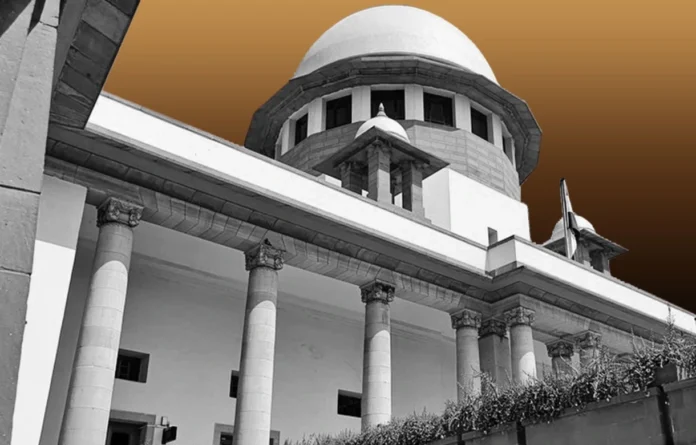The Supreme Court has refused to grant anticipatory bail to the father of a minor co-accused, who was sitting as a passenger in a luxury car that mowed down two motorcycle-borne youth in Pune’s Kalyani Nagar area earlier this year.
The Bench of Justice Sudhanshu Dhulia and Justice Ahsanuddin Amanullah on Tuesday refused to interfere with the October 23 order of the Bombay High Court that dismissed the anticipatory bail application of Arunkumar Devnath Singh, father of the minor co-accused, who was sitting next to the main accused – a Child in Conflict with Law (CCL), during the May 19, 2024 accident.
Appearing for the petitioner, Senior Advocate Vibha Datta Makhija submitted that there was prejudice against the petitioner as he was facing a media trial.
The Bench observed that the Court never went by the prejudice surrounding a case.
On clarification whether the petitioner was related to the minor driver, Makhija replied that the petitioner was the father of the minor co-accused, who was sitting at the back, and had nothing to do with the accident.
The counsel further claimed that the minor co-accused was only partying with his friend.
Also appearing for the petitioner, Senior Advocate Siddharth Luthra mentioned para 26 of the bail order, which said that the applicant failed to make out a case in his favour for this Court to exercise discretion for granting anticipatory bail to him. The question of law raised on behalf of the applicant with regard to the very applicability of Section 467 read with Section 464 of IPC, in the facts and circumstances of the present case, was answered against the applicant. The ingredients of the offences prima facie made out a case against the applicant.
He further submitted that even in the worst-case scenario, Section 201 (causing disappearance of evidence of offence or giving false information to screen offender) of the Indian Penal Code would be attracted. Section 464 and other Sections would have no application.
Senior Advocate Makhija requested the Court to add that the observations made under para 26 were only for the purpose of bail.
However, the Bench refused to interfere with the High Court’s order, stating that whatever was being argued was a matter of trial.
Senior Advocate Luthra sought permission to withdraw the SLP.
The Bench denied permission for the same on the grounds that law was common to everyone. It further observed that for these kinds of facts, the Court would not have given even 20 seconds.
On October 23, 2024, the High Court had noted that applicant Singh had bribed the doctors at the Sassoon Hospital in Pune just after the accident to get his son’s blood samples changed with another co-accused, only to ensure that the medical reports did not indicate the presence of any alcohol in his son’s blood.
The single-judge Bench of Justice Manish Pitale further observed that the parents of CCL, who was driving the Porsche car, also undertook identical action by replacing the blood sample of the said child with that of his mother, in order to ensure that the said child would also go scot-free.
The counsel for Singh argued on merits that the provisions of Section 464 (making false documents by deception) would not apply to him. He contended that the Alcohol Examination Certificate (AEC) could not be said to be a document prepared under ‘deception’ as the Doctor and also the Assistant Chemical Analyser were party to the conspiracy of changing the blood samples and that they were very much aware of the blood samples being exchanged.
Justice Pitale further noted that the deception here was practised by labelling the subject blood sample as that of the minor son of the applicant, while in reality it was the blood sample of co-accused Ashish Mittal.
The High Court observed that applicant Singh, being the father of the co-accused minor, was part of the conspiracy under Section 120-B of the IPC to bring about such deception by affixing of label to show the blood sample to be that of the minor son while it was the blood sample of co-accused Ashish Mittal.
The said label affixed on the blood sample, which was the basis of deception, was created in conspiracy with co-accused Dr. Halnor. Hence, the contention raised on behalf of the applicant that the blood sample was not a ‘document,’ would pale into insignificance. The contention raised on behalf of the State that the applicant was very much part of the conspiracy in committing the offence under Section 464 of the IPC, held good.
A strong prima facie case was made out against the applicant for offence committed under Section 467 of the IPC read with Section 464 thereof. The said document clearly answered the definition of ‘valuable security’ under Section 30 of the IPC, as it certainly created a right in the accused minor son of the applicant of portraying innocence, it added.
The single-judge Bench further pointed out that the main contention of the prosecution was that all the occupants of the vehicle, including the applicant’s son and the CCL driving the car, were in a drunken state. In such a situation, the high-speed car hit the motorcycle from behind, leading to the death of the victims.
It further said there was substance in the contention raised by the Special Public Prosecutor that the applicant remaining absconding created an impediment for the investigating authority to fully and effectively investigate the matter, including the angle of conspiracy and the constituents thereof, hatched by the applicant with the co-accused persons, including the doctors who were bribed for replacing the blood samples.


